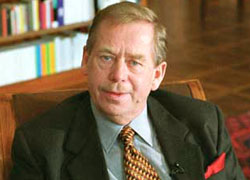Vaclav Havel: “We have to be awake”
8- 12.10.2009, 9:14

Totalitarian enclaves can't continue to exist, so change will definitely come there, former President Czech Republic Vaclav Havel told in an interview to Newsweek.
– What do you make of Moscow's recent behavior toward Georgia and Ukraine? Should Eastern Europeans be alarmed by Russia's rise?
– I think we have to be awake. Russia's current policy has greatly raised our attention, and I think there are some signs that Russia is trying to expand its influence in much more sophisticated ways than before.
– Can you give some examples?
– For instance, it's possible for them to shut down gas and oil pipelines, which has already happened. We also see ourselves being extorted by Russian companies that are buying into strategic Czech companies—Prague Ruzyne Airport is a good example, where Russian ownership of shares has grown to more than half. I don't want to be alarmist. I just say that we shouldn't be naive.
– What do you expect from Washington? Would NATO expansion help?
– The U.S. has long been enhancing Czech security, and it's NATO, much more than the EU, that is the real security anchor of the Czech Republic [and Eastern Europe]. The EU wouldn't have enlarged in 2004 if it hadn't been for the enlargement of NATO in 1999.
– Do you think NATO should include Georgia and Ukraine?
– NATO, like the EU, is based on certain values. But by the same token, both organizations need some geographical definition and they need to be aware of their geographical boundaries. In my opinion, this boundary goes along the western Russian border with Ukraine, Belarussia, etc., and Georgia is a part of Europe in this sense. However, NATO cannot become a second United Nations. It has to be clearly, geographically defined.
– What is your response, two decades after the fall of the Berlin Wall, to the surge of nostalgia for former Soviet times across Eastern Europe?
– It lies in human nature that where you experience your first laughs, you also remember the age kindly. Older people experienced their first joys in that time, and it shapes their remembrance today. There are objective grounds for this nostalgia because the communists cared for the individual from birth to death, something that has gone missing today. As for young people, they are nostalgic for times they never experienced; it's a way of positioning themselves against the establishment, something every young generation everywhere does.
– There was a moment in 1989 when people suddenly lost their fear—when was that?
– It was a process. There isn't one single moment to single out. The awakening had a long prehistory leading up to the big demonstrations.
– Right-wing extremism is on the rise across Eastern Europe. What do you consider its source?
– There are basically two roots. One is the nature of human civilization itself. The other is a reaction that is typical in all post-communist countries. One thing is sure: we have to nip this threat in the bud. That's something the Germans know well, based on their own history.
– How do you see the opportunities for democracy in Cuba, one of the world's last communist countries?
– It's really difficult to judge from outside, as it is from inside as well. We didn't know ourselves back then about when the change would come. What's certain is that a totalitarian enclave like Cuba's can't continue to exist, so change will definitely come there, eventually.










